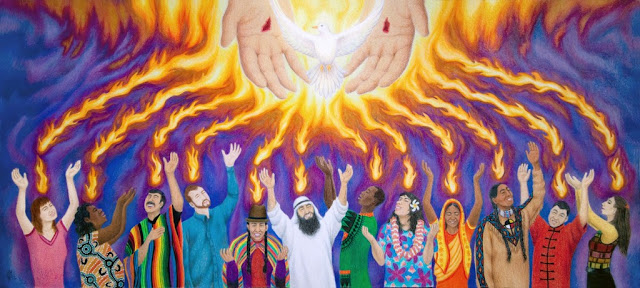Read Introduction to 1 Corinthians
4 “There are diversities of gifts, but the same Spirit. 5There are differences of ministries, but the same Lord. 6And there are diversities of activities, but it is the same God who works all in all.”
Now the Holy Spirit through Paul turns to diversity and catalogue of spiritual gifts. God’s plan for the church is diversity, not uniformity, in spiritual gifts. Each member of the Trinity has a role in spiritual gifts: the Holy Spirit distributes the gifts, the Lord places people in ministry, and the Father empowers people to do ministry. There are varieties in gifts, ministries, and effects but they all have sameness in the Trinity. God’s doctrine is diversity in unity, not uniformity.
12:4
There are diversities of gifts, but the same Spirit.
The word “gift” is the Greek word charismata. The charis part of the word means grace. The ma portion of the word is the passive suffix meaning that it is a grace given. They are grace-gifts. God did the giving or bestowing of the gift upon us. These gifts are not native within us like natural talents. Both Christian and non-Christian alike share capacity for talent but only Christians have spiritual gifts. A gift is a special, supernatural enablement or capacity to do the work of God. Spiritual gifts are not natural capacities; they are supernaturally bestowed capacity.
“Diversities” means distributions, distinctions, allotments, apportionments. The word suggests a separation of something already joined together. God distributes gifts in many varieties. No one gets all the “gifts” for there are different kinds for different people. There are about 20 gifts listed in the New Testament (Ephesians 4:7-11; 1 Corinthians 12:6-8; 1 Peter 4:11).
The “same Spirit” is the Holy Spirit, the third member of the Trinity. The Holy Spirit is the source of all gifts. Sameness comes from source.
There are differences of ministries, but the same Lord.
As there are diversities of gifts, there are differences of ministry opportunity as well. The word “differences” is the same Greek word as “diversities” in verses four and six. The word “ministries” means forms of services. The plural means different kinds of services. It is possible to have the same gift but have a different ministry. Some may use the gift of evangelism in child evangelism while others may use it on the campus. There is variety in uses of gifts. God does not give special supernatural capacities for the self but to serve.
It is the “same Lord,” that is, the second person of the Trinity, that gives different kinds of service. All ministries represent Christ. We are here to represent Him.
12:6
And there are diversities of activities, but it is the same God who works all in all.
The third category of “diversities” is “activities.” The word “activities” means effects and literally has the idea of what is worked out or energized. This word in the Greek (energemata – energizing) means manifestations of the Spirit’s power as over against human power. This is operational power. God empowers the effect. As with gifts and ministries, God gives different effects or results to ministry. There are different results from the use of gifts. God gives some ministries more fruit than others. Ministries to Muslims do not have the same fruit as other ministries.
It is the “same God,” that is, God the Father who works “all in all.” God works all the gifts in all persons.
PRINCIPLE:
God loves diversity, not uniformity.
APPLICATION:
God loves diversity. He does not use a cookie-cutter to stamp out the same pattern of gifts. Diversity has its underpinning in God Himself. He makes Christians wonderfully different from each other. A choir is one but has at least four sections: bass, tenor, alto, and soprano. Each contributes to a unity of beautiful music. This is more beautiful than a choir of all sopranos. There are many members in the choir but there is only one conductor. A football team with uniformity of all guards is not very exciting or effective. The Christian does not have anything to say about whether he plays guard or quarterback.
Spiritual gifts do not indicate merit or spirituality. We do not have a gift because we are better than someone else or because we have had a certain kind of experience. None of us earns or deserves a gift. It is something we discover and use. We cannot say, “What a great person I am because I have such-and-such gift.” What gifts we possess reside in the sovereign decision of God the Trinity.
God gives special, supernatural gifts to every Christian without exception. Each gift is as important as any other gift. God specially designs each gift for each believer. We cannot do God’s work without special endowment of a spiritual gift. Christian work is simply exercising our spiritual gift. There is no difference between a preacher and a plumber. There is no such thing as a “layman.”
We can neglect our gift or fail to use it but if we do, it will atrophy. If we do not use a muscle, it will atrophy and become weaker and weaker. The Holy Spirit enables us to use our gifts.
source
source







No comments:
Post a Comment